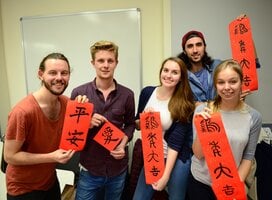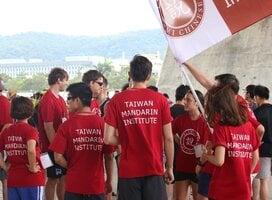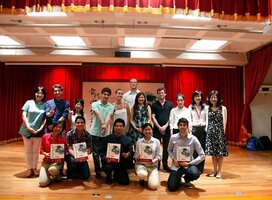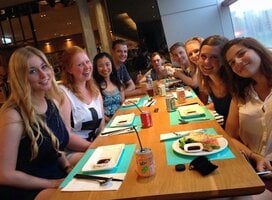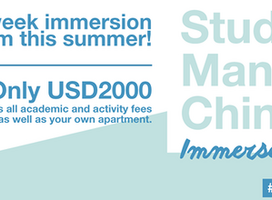Chinese Language Schools in Taiwan
When it comes to learning Chinese from the source, the obvious choice would be China. However, China is a huge country, with dozens of dialects that make it difficult even for locals to understand each other. While China is experiencing a great deal of growth economically and politically, it is still very much in its infancy welcoming foreigners to its land.
With this in mind, take a look at the sweet potato-shaped island 110 miles off the coast of southeast mainland China. This is Taiwan, also known as Formosa or “beautiful island” in Portuguese. This little island is a great place for waiguo-ren, or foreigners/expatriates, to learn authentic Chinese. Here, it is possible to learn traditional Chinese characters (it's also one of our top choices for a destination to learn Chinese on a budget.)
Taiwan is a country that embraces its Chinese culture and heritage with beautiful museums and temples. At the same time, Taiwan is one of the four “Asian Tigers,” a country that has exploded in economic and technological growth to become one of the more stable economies in the world. In this dynamic environment of ancient cultural history, stunning natural beauty, and advanced growth, Taiwan is considered an attractive option for people to learn Chinese from the source.
When it comes to studying Chinese in Taiwan, you can certainly find various programs to fit your needs. Taiwan has you covered if you want to study through a university, or participate in group study or private tutoring. There are several study abroad organizations that can also help students narrow down their focus and take care of the details, such as assistance with housing, visa information, and airport pickup.
As has been stated in various language guides, make certain you know your purpose for studying Chinese. Are you studying it for academic purposes, for business, or for self-improvement and interest? Remember Mandarin Chinese has four tones (well, actually five, if you count the neutral tone), which most foreigners are not accustomed to. Most foreigners report the tones being a challenge to master for the first few months of consistent practice. However, Chinese grammar and structure is easier than you might expect; in many ways, it’s easier than English!
Group courses
These types of courses are readily available year-round. Websites such as Tealit and Forumosa, which are geared towards expats living or wanting to live in Taiwan, are full of information about where to find group classes around the whole island.
If you ask around the university campuses, you may hear about some classes that are offered off-campus. There are a few websites that offer several group course options. They are made to fit the schedules of busy students and working adults, so classes are provided in early mornings, evenings, and weekends.
Group courses can also be short-term programs (3 months in length) or longer, depending on your needs. There are also courses offered specifically for people who want to learn Chinese for business purposes. There are language centers all around; check out Taiwan’s Ministry of Education website for an excellent listing. Some sites even provide information about visas and housing.
University Courses
The language centers are also affiliated with the universities. They offer semester-long courses, transferrable credits, and extracurricular events and activities. If you want to jump ahead and feel like you can keep up, enroll in an intensive course. The following websites are good resources for more information:
Private Tutoring
This is certainly the easiest way to study Mandarin in Taiwan. Usually it’s one-on-one instruction. The tutor will discuss your needs and what you wish to accomplish. It can be as casual or as informal as you wish it to be.
Some of these tutors are university students or professional teachers, who instruct an international clientele. (This author’s Chinese tutor has taught students from the U.S., Japan, Germany, Canada, and India.).
Some private tutors can be found by word of mouth and by websites like Tealit and Forumosa, especially as language exchanges. Again, do your research and be clear in your own mind as to your purpose in learning Chinese. Make sure the tutor you find can speak enough English to help you with context and further explanation, if you are not comfortable enough with Mandarin.
Cultural Immersions/Extracurricular Activities
Depending on your program, you will have the opportunity to enrich your studies further cultural immersions and extracurricular activities. National Taiwan Normal University in Taipei offers culture tours, as well as scheduled events in learning Chinese calligraphy, tai chi, cooking, and idioms and proverbs.
Mandarin Taiwan Study Abroad offers Language Exchange Nights, weekend cultural trips, and Taiwanese roommate programs as part of their Chinese Culture Connection programs. For anyone going through a private tutor or a group class, take advantage of any field trips they might offer.
Also, if you engage in activities like yoga, martial arts, or another kind of lesson back in your home country, find it in Taiwan and take your class in Chinese. You will absorb a lot through that.
Studying Chinese in Taiwan really is an opportunity that should not be missed. It’s a place where you can visit world-class modern cities, beautiful natural surroundings, and rich Chinese culture all in one. You can study the full traditional Chinese characters and speech. It’s a democratic country, where you can enjoy a wonderful lifestyle and where other foreigners are welcome to embrace the Chinese language and culture.
But now, how do you narrow down where in Taiwan to study Chinese?
Taipei
Taiwan’s modern and dynamic capital city has much to offer young students who want to study abroad. It has everything you need if you want to enjoy the Chinese culture, or if you’re craving a Western “fix” of comfort food.
Several of the famous Taiwanese universities are centered in the Da’an District, and you can also find shops in this area that sell implements for Chinese calligraphy and painting. It’s loud and busy, with an excellent MRT system that shuts down around midnight.
Stroll through the parks, especially Da’an Forest Park or the park surrounding Sun-Yat-Sen Memorial Hall, and soak up the language. The National Palace Museum is highly regarded for its collection of Chinese art. And within the city limits are beautiful Yangmingshan Mountain and the famous Beitou Hot Springs.
Learn more about Learning Chinese in Taipei.
Kaohsiung
Located in the southwestern portion of the island, Taiwan’s second-largest city boasts of sunshine and warm temperatures year-round. This port city was the site of the World Games in 2009. Kaohsiung has a thriving art scene, especially public art installations around the city.
Explore the city’s Pier 2 Arts District, which utilized abandoned warehouses and wharves in the city’s shipping area.
For information on studying Chinese in Kaohsiung, the Kaohsiung Mandarin Study Guide has even more details than what we've provided.
Taichung
Taichung is a city with several fine museums, including the National Taiwan Museum of Fine Arts and the National Museum of Natural Science. If you’re in Taichung during October, think about attending their jazz festival. Zhongshan Hall is the place to go for opera, ballet, theatre, and music concerts.
Taichung does have an issue with heavy inner city traffic, and most of the street signage is not in pinyin or Romanized. So, consider that motivation for learning your Chinese characters! For more information on studying Chinese in Taichung, read the Taichung Study Chinese guide.
What do you have to take care of before you go to Taiwan? What are the qualifications you'll need to consider before taking a Chinese course?
Visa
Students coming from the United States need to apply for a visitor’s visa, which can later be upgraded to a resident’s visa (Alien Resident Card) for longer-term stays in Taiwan. The visitor’s visa can be for 90 days.
When filling out the paperwork, you need to bring an official copy of your letter of admissions from the university in Taiwan. The Taiwan’s Ministry of Education website has more information.
Qualifications
Language proficiency requirements will vary depending upon the university or center. Some programs prefer their foreign students to have at least basic proficiency. Certainly if you are in an intensive program, it’s important you are already proficient in enough Mandarin to keep up with the instruction comfortably. If you really want to test your proficiency, consider taking the Test of Chinese as a Foreign Language.
As always, know yourself and your own spending habits before you embark on studying Chinese in Taiwan. While Taiwan is thought to be less expensive than Korea or Japan, sometimes housing costs are expensive and eating out and throwing down money for alcohol and entertainment does add up.
It may be a good idea to bring over at least $1,000 USD to tide you over for the first month (though you may not spend it all). Some of the language centers do offer housing programs or will be able to point you in the right direction in you want to try to find your own place.
Taipei, especially in the Da’an District, can be expensive. Some people believe Kaohsiung has a lower cost of living. Mandarin Taiwan Study Abroad and Taiwan Mandarin Institute both offer housing options for their students. And of course, if you're still a student, you can earn a scholarship!
Scholarships
Sometimes, we can all use a little help in pursuing our dreams. Here are three scholarships that can help you study Chinese in Taiwan:
- Huayu Enrichment Scholarship: This scholarship is awarded by the Taipei Economic and Cultural Representative Office (TECRO). Anyone can be eligible to receive it, and you could receive a monthly stipend of over $850 USD to help with living expenses or whatever else you need while studying in Taiwan.
- Freeman Awards: This scholarship was established by the Freeman Foundation. Its mission is to help students who have solid academic merit, need financial assistance, and who are passionate about studying in Asia.
- Gilman Scholarship: This scholarship assists undergraduates who are interested in studying or interning abroad and who are receiving funding from a Federal Pell Grant.



